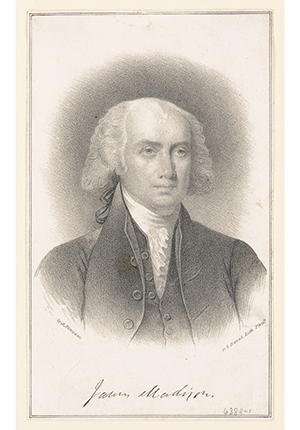Historic Document
Federalist 10 (1787)
James Madison | 1787

Library of Congress, Prints and Photographs Division
Summary
After the Constitutional Convention adjourned in September 1787, heated local debate followed on the merits of the Constitution. Each state was required to vote on ratification of the document. A series of articles signed “Publius” soon began in New York newspapers. These Federalist Papers strongly supported the Constitution and continued to appear through the summer of 1788. Hamilton organized them, and he and Madison wrote most of the series of eighty-five articles, with John Jay contributing five. These essays were read carefully and debated in newspapers, primarily in New York. The Federalist Papers have since taken on immense significance, as they have come to be seen as the definitive early exposition on the Constitution’s meaning and giving us the main arguments for our form of government. In Federalist 10, Madison fulfills the promise made in Federalist No. 9 to demonstrate the utility of the proposed union in overcoming the problem of faction. Madison’s argument is the most systematic argument presented in the Federalist Papers, with syllogistically developed reasoning sustained virtually throughout.
Selected by

William B. Allen
Emeritus Dean of James Madison College and Emeritus Professor of Political Science at Michigan State University

Jonathan Gienapp
Associate Professor of History at Stanford University
Document Excerpt
Among the numerous advantages promised by a well-constructed Union, none deserves to be more accurately developed than its tendency to break and control the violence of faction. The friend of popular governments never finds himself so much alarmed for their character and fate, as when he contemplates their propensity to this dangerous vice. …
The valuable improvements made by the American constitutions on the popular models, both ancient and modern, cannot certainly be too much admired; but it would be an unwarranted partiality, to contend that they have as effectually obviated the danger on this side, as was wished and expected. Complaints are everywhere heard from our most considerate and virtuous citizens, equally the friends of public and private faith, and of public and personal liberty, that our governments are too unstable; that the public good is disregarded in the conflicts of rival parties; and that measures are too often decided, not according to the rules of justice, and the rights of the minor party, but by the superior force of an interested and overbearing majority. These must be chiefly, if not wholly, effects of the unsteadiness and injustice, with which a factious spirit has tainted our public administrations.
By a faction, I understand a number of citizens, whether amounting to a majority or minority of the whole, who are united and actuated by some common impulse of passion, or of interest, adverse to the rights of other citizens, or to the permanent and aggregate interests of the community.
There are two methods of curing the mischiefs of faction. The one, by removing its causes; the other, by controlling its effects. There are again two methods of removing the causes of faction. The one, by destroying the liberty which is essential to its existence; the other, by giving to every citizen the same opinions, the same passions, and the same interests.
It could never be more truly said, than of the first remedy, that it is worse than the disease. Liberty is to faction what air is to fire, an aliment without which it instantly expires. But it would not be a less folly to abolish liberty, which is essential to political life because it nourishes faction, than it would be to wish the annihilation of air, which is essential to animal life, because it imparts to fire its destructive agency.
The second expedient is as impracticable, as the first would be unwise. As long as the reason of man continues fallible, and he is at liberty to exercise it, different opinions will be formed. As long as the connection subsists between his reason and his selflove, his opinions and his passions will have a reciprocal influence on each other; and the former will be objects to which the latter will attach themselves. The diversity in the faculties of men, from which the rights of property originate, is not less an insuperable obstacle to an uniformity of interests. The protection of those faculties is the first object of government. From the protection of different and unequal faculties of acquiring property, the possession of different degrees and kinds of property immediately results; and from the influence of these on the sentiments and views of the respective proprietors, ensues a division of the society into different interests and parties.
The latent causes of faction are thus sown in the nature of man; … and rendered them much more disposed to vex and oppress each other, than to co-operate for their common good. So strong is this propensity of mankind, to fall into mutual animosities, that where no substantial occasion presents itself, the most frivolous and fanciful distinctions have been sufficient to kindle their unfriendly passions and excite their most violent conflicts. But the most common and durable source of factions has been the various and unequal distribution of property. Those, who hold, and those who are without property, have ever formed distinct interests in society. Those who are creditors, and those who are debtors, fall into a like discrimination. A landed interest, a manufacturing interest, a mercantile interest, a moneyed interest, with many lesser interests, grow up of necessity in civilized nations, and divide them into different classes, actuated by different sentiments and views. The regulation of these various and interfering interests forms the principal task of modern legislation and involves the spirit of the party and faction in the necessary and ordinary operations of government. …
It is vain to say, that enlightened statesmen will be able to adjust these clashing interests and render them all subservient to the public good. Enlightened statesmen will not always be at the helm. …
The inference to which we are brought is, that the causes of faction cannot be removed; and that relief is only to be sought in the means of controlling its effects.
If a faction consists of less than a majority, relief is supplied by the republican principle, which enables the majority to defeat its sinister views, by regular vote. It may clog the administration; it may convulse the society; but it will be unable to execute and mask its violence under the forms of the constitution. When a majority is included in a faction, the form of popular government, on the other hand, enables it to sacrifice to its ruling passion or interest, both the public good and the rights of other citizens. To secure the public good, and private rights, against the danger of such a faction, and at the same time to preserve the spirit and the form of popular government, is the greatest object to which our inquiries are directed. ...
By what means is the object attainable? Evidently by one of two only. Either the existence of the same passion or interest in a majority, at the same time must be prevented; or the majority, having such coexistent passion or interest, must be rendered, by their number and local situation, unable to concert and carry into effect schemes of oppression. …
From this view of the subject, it may be concluded, that a pure democracy, by which I mean a society consisting of a small number of citizens, who assemble and administer the government in person, can admit of no cure from the mischiefs of faction. …
A republic, by which I mean a government in which the scheme of representation takes place, opens a different prospect, and promises the cure for which we are seeking. Let us examine the points in which it varies from pure democracy, and we shall comprehend both the nature of the cure and the efficacy which it must derive from the union. The two great points of difference, between a democracy and a republic, are, first, the delegation of the government, in the latter, to a small number of citizens elected by the rest; secondly, the greater number of citizens, and the greater sphere of country, over which the latter may be extended.
The effect of the first difference is, on the one hand, to refine and enlarge the public views, by passing them through the medium of a chosen body of citizens, whose wisdom may best discern the true interest of their country, and whose patriotism and love of justice, will be least likely to sacrifice it to temporary or partial considerations. Under such a regulation, it may well happen, that the public voice, pronounced by the representatives of the people, will be more consonant to the public good, than if pronounced by the people themselves, convened for the purpose.... The question resulting is, whether small or extensive republics are most favorable to the election of proper guardians of the public weal; and it is clearly decided in favor of the latter by two obvious considerations.
In the first place, it is to be remarked, that however small the republic may be, the representatives must be raised to a certain number, in order to guard against the cabals of a few; and that however large it may be, they must be limited to a certain number, in order to guard against the confusion of a multitude. Hence, the number of representatives in the two cases not being in proportion to that of the constituents, and being proportionately greatest in the small republic, it follows that if the proportion of fit characters be not less in the large than in the small republic, the former will present a greater probability of a fit choice.
In the next place, as each representative will be chosen by a greater number of citizens in the large than in the small republic, it will be more difficult for unworthy candidates to practice with success the vicious arts, by which elections are too often carried; and the suffrages of the people being more free, will be more likely to center in men who possess the most attractive merit, and the most diffusive and established characters. …
The other point of difference is, the greater number of citizens, and extent of territory, which may be brought within the compass of republican, than of democratic government; and it is this circumstance principally which renders factious combinations less to be dreaded in the former, than in the latter. .. Extend the sphere, and you will take in a greater variety of parties and interests; you make it less probable that a majority of the whole will have a common motive to invade the rights of other citizens; or if such common motive exists, it will be more difficult for all who feel it to discover their own strength, and to act in unison with each other. …
Hence, it clearly appears, that the same advantage, which a republic has over a democracy, in controlling the effects of faction, is enjoyed by a large over a small republic - enjoyed by the union over the states composing it. …
In the extent and proper structure of the union, therefore, we behold a republican remedy for the diseases most incident to republican government.




